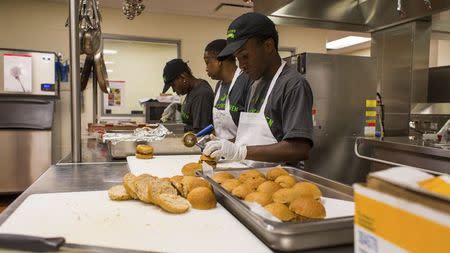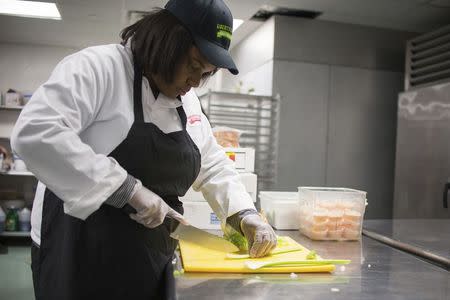In New Orleans, training a lost generation while feeding the next
By Jonathan Kaminsky NEW ORLEANS (Reuters) - At age 17, Akira Holmes dropped out of high school and had a baby. Last week, the 18-year-old stood in a crisp white chef's jacket at a cafe in New Orleans, on the cusp of completing a training program she expects will transform her life. Liberty's Kitchen, which moved last fall to a sleek 10,000-square-foot space housing a professional kitchen and an eatery, endeavors to throw lifelines to young people on the verge of being swallowed by poverty and crime. Some of its trainees, aged 16-24, are homeless. Many have criminal records. Most have dropped out of school. Liberty's Kitchen also provides healthy, fresh meals for some of the city's poorest school children. Holmes smiled broadly while explaining how Liberty's Kitchen, with its four-month program encompassing practical kitchen skills and lessons in responsibility, had come to feel less like school or work and more like family. "It's wonderful," she said. "I've been going through so much stuff at home, this is my only escape. It just keeps me up and keeps me going forward." Founded in 2008 in a rundown duplex across from New Orleans' criminal courthouse, Liberty's Kitchen is among a growing group of social enterprises nationwide focusing on job training and operating food-oriented businesses. A consortium of like-minded entities, known collectively as Catalyst Kitchens, run programs ranging from barista training for kids in Seattle to teaching the unemployed in Washington, D.C. to cook. Since 2011, membership has tripled to 67 in the United States and Canada. Liberty's Kitchen, which had an inaugural class of two students and last year graduated almost 50, is unusual in how quickly it has scaled up and in its prospects for further expansion in a city where, uniquely, almost all public school students are in charter schools, which can individually contract with companies to feed their kids. It also has the dubious recruiting advantage of being in a crime-stricken city, where 39 percent of children live in poverty, according to a recent study by the Louisiana-based Data Center. FOOD KIDS WANT TO EAT The organization was founded by Janet Davas, an oil company executive eager to do good in a city still reeling from Hurricane Katrina and dismayed by the treatment of a segment of the population – poor and mostly black – that in her view "has not been valued by society." Within a year, the non-profit won its first contract to provide school meals. At the time, more than half the 400 students at New Orleans College Prep were so repulsed by the cafeteria food they would refuse a lunch tray, despite many being too poor to pack meals, Davas recalled. Liberty's Kitchen now feeds the charter group's 1,300 students across three schools up to four meals daily, all cooked on site and, whenever possible, from scratch. It recoups between 55 and 60 percent of its operating expenses through earned revenue, with the remainder made up by grants and donations. On a recent day in the cafeteria at Lawrence Crocker College Prep, students sat down to a lunch of soy and ginger-glazed pulled pork, vegetable fried rice and green beans. When a first-grader dropped a half-eaten apple on the floor – the only dessert Liberty's Kitchen serves is fresh fruit – he appeared close to tears before a school worker offered a replacement. "It's awesome," said Amanda Aiken, the school's principal, referring to both Liberty's Kitchen's ethos and its product. "The kids want to eat it. The teachers want to eat it. Normally cafeteria food is gross." Having settled into its new home alongside a Whole Foods grocery story, which sells the non-profit's gumbo and two of its salad dressings, it wants to double both the number of school children it feeds and students it trains within three years, as well as begin using its trainees in preparing some of the school food. It also plans to extend the support it provides to trainees, many of whom dread leaving and struggle once gone. To that end, it will soon hire a second social worker and add a post-graduate job training program in an effort to improve on the 75 percent of graduates who are working after a year, mostly in the food service industry. Among those who seem unlikely to struggle after graduation is Kiall Wilson, 22, who is practiced at filleting fish from his stint at a grocery story and who speaks confidently of opening his own restaurant specializing in Southern comfort food. "This program is really working out for me," he said. "I'm doing something that I'm passionate about." (Editing by Jill Serjeant and Leslie Adler)

 Yahoo News
Yahoo News 

